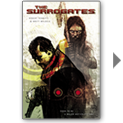(un)scripted: Accidents do happen
Having spent seven years studying English and Creative Writing at the university level, I’m familiar with what scholars and professors refer to as “literary criticism,” the process of analyzing literary works to discern what the writer was “really trying to say.” It’s a common assignment, particularly in graduate school: Examine [insert novel, short story, play, etc. here] and write a [insert page requirement here] paper about [insert topic of the professor’s (or, if you’re lucky, your own) choosing here]. The idea isn’t without merit, as all of that reading and analyzing forces you to think about a story beyond its plot.
I know of at least three colleges that have taught The Surrogates in their classes, so surely a paper or two has been written about it. I wonder if anyone studying the text has picked up on the name of the company that manufactures surrogates, Virtual Self, Inc., and how the acronym (VSI) alludes to the concept of surrogate technology putting users at war with their identity (VSI = versus I = versus the self). It’s a logical assumption to make, that while creating a story billed as “a commentary on identity,” the writer would employ such a clever technique.
It’s also a complete coincidence. It was only a few months ago that I realized the correlation, and I couldn’t help but laugh. Looking back on my past attempts at criticism, I wonder in how many instances I attributed a nuance of language to James Fennimore Cooper’s (or F. Scott Fitzgerald’s, or Ernest Hemingway’s . . .) clear intent to [insert bold statement here], when really no such intent existed. Sometimes the name of a fictional company is merely the result of the writer not really being good at naming things, so he took an adjective and a noun that summed up the company’s product, slapped “Inc.” on the end of it, and got on with his life (imagine Henry Ford naming his company Consumer Automobiles, Inc., and you’ve got the general idea).
Years ago I saw a show on Book TV, during which historian Stephen E. Ambrose moderated a discussion between Joseph Heller and Kurt Vonnegut. During the Q&A segment, a woman from the audience stepped to the microphone and asked Vonnegut if a particular character from one his novels (I believe it was Bluebeard) was meant as a commentary on feminism, and figuring the answer to be foregone, praised him for his remarkable insight (or something to that effect—the actual inquiry was quite long and detailed, the sort of thing that I imagine took the woman some time to come up with, and I don’t remember it all).
Vonnegut replied tersely that he had no memory of the character in question.






6:51 pm on January 29th, 2010
The truth is that you’re simply too smart for yourself.
Your brain is trying desperately to get all these ideas out… and it’s being limited by your pitiful flesh. 😉